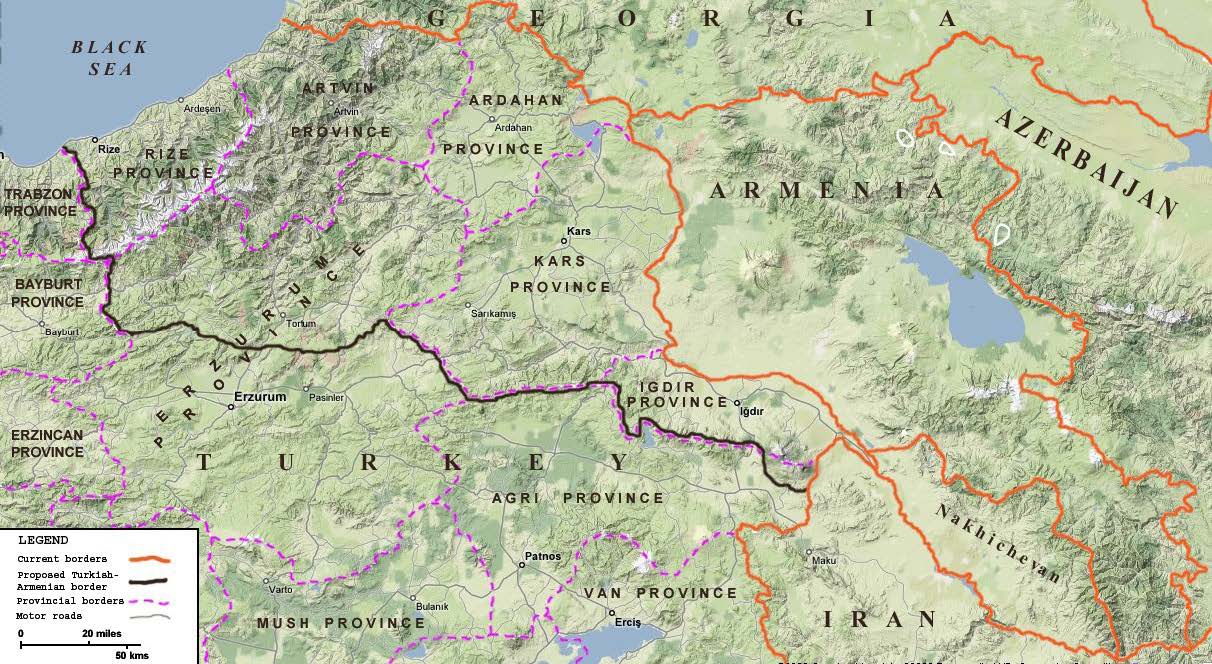David Davidian*, Yerevan, Armenia February 2019
Abstract: Full United States recognition of the Armenian genocide and support for reparations forms the cornerstone of an Armenia allied with United States interests. In return for this game-changing effort, the US seizes the ability to influence local and regional affairs, currently unattainable, furthering and strengthening stability across the entire region.
Background: Accelerated international recognition of the 1915 extermination of the Armenians, as de jure genocide, is a departure from the status quo. With this widening recognition, border adjustments, monetary and cultural reparations have been proposed. The Armenian genocide is no longer restricted to academic forums and has taken on characteristics of a mainstream issue. While official Ankara still denies this genocide, the Turkish press publishes articles associated with and using the term genocide. The genocide taboo has somewhat diminished with Turkey anemically coming to grips with its past and needs a catalyst.
Clear precedent exists for the United States taking active roles regarding the status of Armenia, including: the 1919 King-Craine Commission, the Arbitral Award on Turkish-Armenian Boundary by the U.S. President Woodrow Wilson, the US position classifying the massacres of Armenians as genocide in the Advisory Opinion of May 28, 1951 stated at the initiation of the UN Genocide Convention. Forty-eight of the fifty US states have formally recognized this genocide as have twenty-nine nations, the Vatican, the Council of Europe and the European Parliament, and the Latin American Parliament.
The current policy of the United States is not to view the extermination of the Armenians as a genocide. This policy is multifaceted and is primarily based on the geopolitical role Turkey plays in US foreign and military policies, even as reluctant a NATO member. Turkey lies in a volatile region of the world and is home to many forward-deployed US military formations.
However, the United States can create strategic benefit by the full recognition of this genocide, ushering reparations and border adjustments, as seen on the accompanying map, that will generate geopolitical value for an enlarged Armenian territory. This benefit is accomplished by sovereign Armenian access to the Black Sea by abandoning the partially abrogated Treaty of Kars, increasing and vastly diversifying Armenia’s arable land, mineral resources, etc. A negotiated Turkish-Armenian border adjustment, supported by the United States, fulfilling the need for genocide reparation, is an unprecedented vehicle for the advancement of US strategic interests1, where:
- Armenia will become capable of integrating with free-market economies and adhering to international norms and basic tenets of modern US economic policy,
- Armenia can enter into political and economic relations based on its inherent interests, in contrast with those imposed,
- Regional cooperation and integration is promoted under US stewardship,
- Armenia becomes capable of modulating specific east-west strategic initiatives being at the intersection of Turkish, Russian, and Iranian political spheres, achieved at a minimal cost,
- Armenia and Turkey will enter into a cordial relationship, which has always been encouraged by the US and its EU allies,
- Genocide references and associated demands are removed as a tool against Turkey’s EU ascension, a membership effort backed by the US,
- With enhanced geopolitical relevance, Armenia can provide a north-south economic corridor, allow for more efficient east-west hydrocarbon transport routing, and effectively participate in the New Silk Road Initiative.
- US policy and economic interests in Turkey need not be significantly The issue is not zero-sum. However, the current US intelligence threat assessment states, “Under President Erdogan, US -Turkish relations will be important but not decisive for Ankara.”2
- Turkey understands that this part of their history has to be addressed and full US political recognition provides a factor in generating realistic Turkish reaction to genocide recognition as a historical fact by other states has been functionally superficial, despite heightened diplomatic hyperbole.
In summary: In advancing United States strategic international goals, a politically stable Southern Caucasus needs to be established. A large part of this process can be uniquely accomplished, unparalleled in recent history, by utilizing reparations made available by Turkey to Armenia in the form of a border adjustment and monetary compensation. The US, with formal recognition of this genocide and support for de jure reparations, is in a unique position to take advantage of this opportunity.
1 Eric Rubin, Deputy Assistant Secretary, European and Eurasian Affairs, U.S. State Department, audio starting at approximately the 30-minute mark: Considerations and constraints for U.S., EU, and Turkish engagement in the South Caucasus, Brookings Institution, July 15, 2015
2 Dan Coats Director of National Intelligence Annual Threat Assessment Opening Statement Tuesday, January 29, 2019, page 12
* David Davidian is a US-born citizen residing in Armenia. He is an Adjunct Lecturer at the American University of Armenia.


